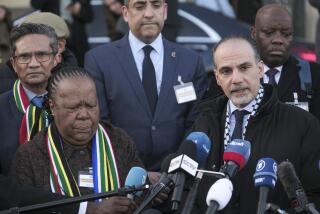S. Africa A-Arms Program Since ‘70s Told : Weapons: CIA documents dispute official denials from Pretoria. 1979 test is recalled.
- Share via
WASHINGTON — South Africa has had an active nuclear weapons program since at least the mid-1970s, despite years of official denials from Pretoria, according to recently declassified CIA documents.
South Africa almost certainly conducted an atmospheric test of a low-yield nuclear bomb off its coast in 1979, the documents state. Pretoria has never acknowledged possession of nuclear weapons and the U.S. government has never publicly stated that it believes South Africa is capable of producing them.
While most of the world has assumed that South Africa carried out the Sept. 22, 1979, test, which was detected by U.S. intelligence satellites, Pretoria has clung to its “longstanding practice of cloaking its nuclear intentions in ambiguity,” the CIA said.
The CIA report also said that Israel cooperated closely with South Africa in the 1970s on nuclear weapons programs and provided “various sorts of advanced non-nuclear weapons technology to South Africa.”
Officials of the South African Embassy in Washington did not return telephone calls seeking comment on the disclosures.
A spokeswoman for the Israeli Embassy here said that Jerusalem repeatedly has denied any cooperation in nuclear weapons matters with South Africa.
In March, 1987, the Israeli Defense Ministry announced it was suspending all new weapons development contracts with South Africa, and the Israeli government has strictly adhered to that decree, she said.
The CIA report, which was prepared in December, 1979, was released in heavily edited form in response to a Freedom of Information Act request from the Natural Resources Defense Council.
“This marks the first time that the U.S. government has confirmed that South Africa has had a dedicated nuclear weapons program and the U.S. government knew about it,” Richard Fieldhouse, a senior researcher with the environmental group, said Wednesday.
Fieldhouse added that the disclosures call into question South Africa’s stated intention to sign the Nuclear Non-Proliferation Treaty, saying that it would be “an empty and cynical gesture because South Africa would maintain the ability to produce nuclear weapons quickly.”
He said South Africa continues to seek nuclear weapons technology from a variety of sources, despite international efforts to halt exports of sensitive technology to the racially polarized nation.
Fieldhouse noted that the U.S. Customs Service last week raided a Boynton Beach, Fla., firm for allegedly selling guidance components for nuclear-capable ballistic missiles to South Africa.
The CIA report, entitled “The 22 September 1979 Event,” gives previously classified details of the blast off the coast of southern Africa and explores the question of who was responsible.
The explosion was assumed to be a nuclear blast with a yield of less than three kilotons, about a quarter the size of the Hiroshima bomb and equivalent to the yield of a nuclear-tipped artillery shell. The test was carried out in darkness and under heavy cloud cover.
The report indicates that South Africa was the only likely source of the test, noting that South Africa had an active nuclear weapons development program and sufficient supplies of highly enriched uranium to build several small bombs.
The agency said that the South African government earlier suspended nuclear tests planned for two years because “strong U.S. pressure and other international reactions appeared to have deflected South Africa at least temporarily from testing.”
The 1979 explosion was carried out in secrecy over remote waters off South Africa’s southern coast after the nation’s authorities declared the harbor and the naval base at Simonstown to be off-limits to the public.
“Although such a closure might not be required for a nuclear test at sea, it could have screened sensitive loading or unloading operations as well as ship movements,” the agency said.
More to Read
Sign up for Essential California
The most important California stories and recommendations in your inbox every morning.
You may occasionally receive promotional content from the Los Angeles Times.












